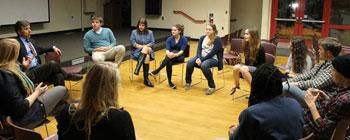Dickinson College
Campaign Strategies
One Class' Journey to Election Day
by MaryAlice Bitts-Jackson
As student groups stumped for their candidates and the college hosted educational forums, many students across campus delved even deeper into issues relating to the 2012 presidential and state elections through classroom discussions and assignments. But few get a more detailed, clear-eyed view of the daily twists and turns of the current election cycle than students in Visiting Instructor of in Political Science Brandon Lenoir's Campaign Strategies course.
Each week, students analyze the latest election news and advertising in their home-state elections and at the federal level. Then they place the news into historic context and predict the success of each candidate, based on the latest developments. And in the process, they move toward the near-impossible, even for seasoned political-analysis pros: clear-eyed, fair reporting.
For these students of law & policy, political science and related majors, that's the ultimate challenge, because the more passionate one is about a given subject, the tougher it can be to separate opinion from fact.
"The students are picking out strengths and weaknesses in the candidates on both sides and that can be a challenge, because most students, like most voters, come into the class with bias," Lenoir says. "As the semester progresses, their writings become more balanced."
Political-science major Michael Meyers '14, who entered the class as an undecided voter, reports that the exercise helped him to select a candidate based solely on facts that he had gathered from both sides of the political aisle.
The class also is helpful for Christopher Erly '13, as he learns to distinguish political substance from spectacle. "I want to think that campaigns are about appealing to people with ideology and policy, but in reality, to the average voter, it's just a show," Erly says, adding that he was surprised to learn just how carefully scripted and rehearsed the candidates' seemingly off-the-cuff comments often are. "It seems more like cheering for your favorite football team—Democrat or Republican—than planning for the future. Many voters religiously vote for their party without careful consideration of that party's platform."
Like Erly, Siobhan O'Grady '13 relishes the chance to buck that trend.
A native of Massachusetts who volunteered for Elizabeth Warren in her hometown before joining Students for Barack Obama at Dickinson, O'Grady doesn't shy away from the challenge when, just days before Hurricane Sandy swept through the Northeast, she was asked to predict the election's outcome, were it held on that day.
Noting that poll results are unreliable, O'Grady focuses on demographics and concludes that Obama will capture a few of the key battleground states, displaying a level of critical thinking that would make her professor proud."Of course, if he loses Pennsylvania, there's little hope he could win the Electoral College, which is why both the senatorial and presidential races are in dead heats," she concedes. "That's why this is so exciting."
So as tough as it is for a political junkie to remain objective, the rewards are great. "It's really tough for me to read an article about Mitt Romney winning points in a certain state when I'm an avid supporter of President Obama, and then to write about it objectively, but it's been great," O'Grady says. "The class is divided pretty well between Republicans, Democrats, and even a few undecided voters, so the dynamic of the classroom has been fun."
Published November 5, 2012